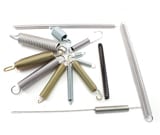 Coil spring manufacturing processes are used in the production of a variety of springs. The familiar shaped compression spring, extension spring, and torsion spring are all formed by coil manufacturing processes. Coiled springs are common elastic objects that store and release mechanical energy. They are manufactured, primarily, from various types of steel and produced in a variety of shapes and sizes. Manufacturers rely on this simple mechanism in the production of countless applications, devices, and products.
Coil spring manufacturing processes are used in the production of a variety of springs. The familiar shaped compression spring, extension spring, and torsion spring are all formed by coil manufacturing processes. Coiled springs are common elastic objects that store and release mechanical energy. They are manufactured, primarily, from various types of steel and produced in a variety of shapes and sizes. Manufacturers rely on this simple mechanism in the production of countless applications, devices, and products.
Industries rely on coil springs to produce the parts and components used in the production of goods, machinery, tools, devices, equipment and numerous other products. Material consideration will in large part be determined by the type of spring application before it’s turned on the coiling machine.
Coil Spring Materials
Many materials are available to manufacture springs. Though hardened spring steels are one of the more commonly used materials in industrial applications, the selection of materials for use will rely in large on the mechanical properties that the application requires. Tensile and high yield strengths, resistance to chemicals and moisture and the like, will influence the material selection as well as the design, fabrication, and manufacture of the spring.
Though it is not uncommon for non-ferrous metals like titanium or bronze to be used in coil spring manufacturing processes or even non-metal materials like plastic, the majority of springs are manufactured with various alloyed metals. Prime among them are alloy spring steels, which hold mechanical properties that possess high tolerances for application conditions where immense impacts, extremely high stress and heavy loads are required. Other common spring alloys are high-carbon spring steels, stainless spring steels, copper-based spring alloys, and nickel-based spring alloys.
Processes
Spring steels can be hardened before or after formation. Coil spring processes begin with bar stock which is formed into long wire to be used and fed into an auto-coiler. For smaller production runs, wire stock can be coiled on a lathe, but for the majority of applications, automated coil spring machines are used. Coiling machines force spring wire into a coiled shape. Adjustable to meet the coil tension, length, design, and amount, the machines spin the wire around a cylinder at high speeds. The quick spinning action forces the spring to adapt into a coiled helical shape.
Raw material wire is placed on a rotating holding reel where it is fed into the coiling machine. Wire may be cleaned or lubricated prior to entry into the coiling machine’s drive rollers. As the wire is fed into the coiler it is deformed against a pair of fixed coiling tip tools positioned to helix the deformed wire into a coil. A pitch tool then introduces the spring’s pitch, shaping it into the necessary coil design. A moving cutting tool and fixed mandrel cut the wire to length as the spring is produced. The spring is then ejected onto a conveyor or into a storage bin further finishing operations—grinding, tempering, peening, coating and any other finishing requirement as needed.
Today’s coiling technologies combined with an abundance of spring materials allow manufacturers to meet the most challenging application requirements. Coil spring designs offer versatility and functionality. Numerous industries—aerospace, automotive, medical, residential and commercial construction, agriculture, mining, household goods and products, electronic devices and many more applications all require spring components to manufacture their products. The list of spring applications are exhaustive—clocks, cell phones, mobile devices, a car’s suspension, retractable pens, garage doors and door handles, toys, furniture, locks, and so on.
Coil spring manufacturing processes vary in relation to the application requirements of the spring. Compression, extension, and tension springs are familiar types of coiled springs that are used in numerous mechanical devices and products to properly function. Once manufactured, coiled springs applications are found in a wide variety of ordinary everyday products like computer keyboards and toasters and in advanced commercial or heavy industrial applications ranging from medical equipment to foundations for buildings.
If you’re looking for a dependable coil spring manufacturing company, James Spring can help. Our extensive line of springs means we can deliver the springs you need quickly, and if you don’t see what you need we can manufacture custom springs to your specifications.

